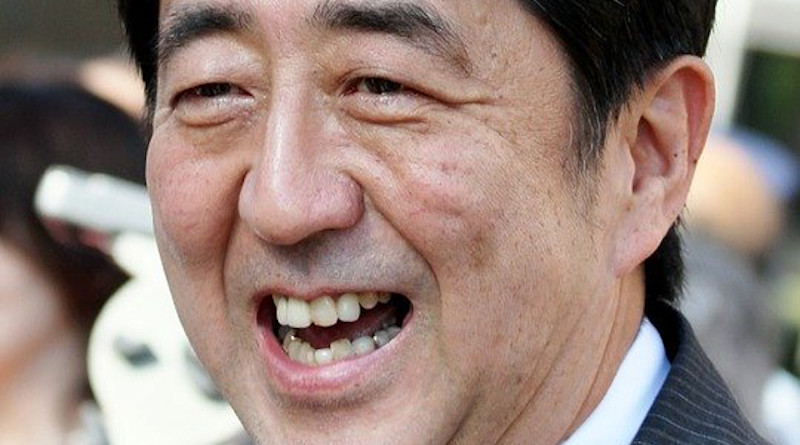Japan: Why The Election Mr Abe? – OpEd
By Fraser Cameron
Few Japanese understand why Prime Minister Shinzo Abe called a snap election for 14 December when he still had a clear majority in the Lower House and two years before he had to go to the polls. The reason given, that he wanted a fresh mandate for his economic policies, seems strange and unconvincing to most Japanese.
Abenomics, as the PM’s policies have become known, promised to move Japan out of its decade-long stagnation. But so far the results have been mixed. This year Japan fell back into recession with GDP shrinking 1.6% in the third quarter. It had fallen 7.3% in the second, but that followed the April sales tax hike from 6 to 8%. The surprise was that there was no third-quarter bounce-back. The news was so grim that Prime Minister Abe said he would delay by 18 months the final tax hike (to 10%) set for next October, and promised to increase government spending.
The Bank of Japan has also let it be known that it will continue with quantitative easing. The yen has fallen sharply against the dollar but exports have not increased. Inflation is a mere 1.3% and unemployment an envious 3.6%, one of the lowest in the Western world. But Japan faces an enormous public debt and severe long-term structural problems of which demography is one of the most serious.
In these circumstances one would think it might lead to a change in the current coalition government comprising the LDP and Komeito. But the polls show that the main challenger to the dominant Liberals, the Democratic Party of Japan (DPJ), is unlikely to win more than 20% of the vote. The other opposition parties including the Japan Innovation Party and the Party for Future Generations are hopelessly divided and will be fighting for survival. Abe will thus almost certainly be back as Prime Minister albeit with a likely reduced majority.
What he will do then remains to be seen. His critics suggest that the hidden agenda for the new election is twofold. First, to gain a further four years in power so that he can secure a change to the constitution to allow Japan’s self-defence forces to engage in combat operations in support of allies. Second, he wants to push through a bill to restart nuclear power plants. Both policies are unpopular with the voters but Abe hopes that the new mandate will give him time to secure the changes.
On foreign policy Abe is unlikely to change his nationalist outlook. Closer relations with the US and developing ties with Japan’s new friends in ASEAN, plus Australia and India will be the top priority. Abe will also seek to resolve the abductee issue with North Korea, a very emotive subject for Japan. If he succeeds then he may try and forge a rapprochement with China, building on the first meeting he had with President Xi Jinping in Beijing two weeks ago. That would indeed be a historic development.
But all this rests on an economic recovery which is highly questionable. Japan has been in steady decline for a decade. Some have continued to prosper – those in secure jobs and shareholders. But an increasing number of Japanese do not have life-long job contracts and have seen their standard of living drop in recent years. To add to Abe’s woes, he will have to reform the social security system to deal with the sharply increasing aging population. The number of Japanese in the workforce is set to decline by 10% over the next decade. If Abenomics does not work in his second term then his domestic and foreign policy ambitions will be severely affected. The omens are not good.
What does this mean for the EU? Essentially there will be a pause in the negotiations for an EU-Japan FTA and the accompanying framework agreement. If Abe secures a healthy endorsement from the voters he may be able to take the difficult decisions, especially on market access, that will be needed to secure a deal with the EU (and US). But if not then the negotiations with the EU (and US on TPP) may well drag on without any conclusive outcome.

